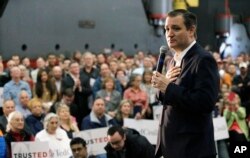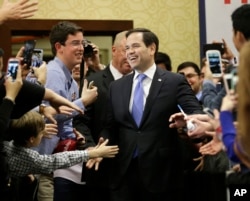Two wings of a divided Republican party have focused the most intense attacks to date on frontrunner Donald Trump in a last-chance bid to stop the billionaire businessman's momentum before a set of crucial primary elections.
After weeks of battling one another, Florida Senator Marco Rubio and Texas Senator Ted Cruz - representing the party establishment and its conservative wing respectively - unleashed a barrage of attacks on the outspoken candidate in a final debate before Super Tuesday balloting in 11 states.
Apparently unfazed, Trump was effusive Friday in a press conference where he ridiculed Rubio and announced the high-profile endorsement of New Jersey Governor Chris Christie - himself a presidential contender until he dropped out earlier this month.
Rubio enjoyed one of his best performances of the campaign in Thursday's debate, joining with Cruz to raise questions about lawsuits past and present against Trump and charges that he covers up a thin policy platform with the same repeated statements.
Analysts say those attacks may have come too late to change the minds of voters who are attracted to Trump and the way he questions longstanding Republican Party orthodoxy.
“Trump has come in and changed the conversation in ways that traditional Republicans are not ready to accept,” said John Feehery, a Republican pundit who heads the CGA Public Affairs Group in Washington.
That nervousness doesn’t necessarily translate into a consensus on an alternative. Analysts and the media talk about a so-called “establishment lane” but Feehery says it’s not as simple as a monolithic group of donors and insiders deciding on one candidate to challenge Trump.
Previously, only Jeb Bush had challenged Trump directly in debates. Feehery notes Bush’s donors are from the group most likely to be thought of as “establishment” Republicans. They haven’t immediately united behind one-term Senator Rubio while Ted Cruz’ donors are unhappy with the party establishment and unlikely to join forces with others.
“They’re all starting to realize that if they don’t take out Donald Trump, he’s going to run away with it,” said Feehery. “That’s why they’ve sharpened the knives and started going after him.”
Cruz and Rubio took aim at Trump while holding back on attacks on each other, but, the most successful criticism of Trump may have come hours earlier on Twitter from the last man to hold the nomination - Mitt Romney – who alleged that Trump's confidential tax returns contain highly damaging information.
The Romney camp stands out for its attacks as donors and establishment figures stay out of the fray for fear of lawsuits and being called out directly by Trump.
Must-win states
The path forward for Ted Cruz leads through his home state of Texas, one of 11 states holding votes on Super Tuesday. Feehery said Republican voters in Texas face an interesting choice that may shed light on the future of the party moving forward.
Cruz is loved by many anti-establishment Texan Republicans but his anti-Washington talk has alienated more mainstream members of the party.
“The question is – where do they go? Do they go with Trump to knock out Cruz or do they spread their votes among Rubio and Kasich?” he said.
Meanwhile, Marco Rubio has yet to win a state in a caucus or primary contest. Trump's nomination is not inevitable if Rubio can stay alive until the March 15 primary in his home state of Florida, said political analyst Stu Rothenberg.
Feehery agreed, saying, “At some point in time, you’ve got to start winning delegates and if Rubio can’t win Florida, he can’t win anywhere.”
If Rubio and Kasich continue on in the race, the possibility of uniting the two men in some combination of a presidential-vice presidential ticket becomes attractive.
“That’s the dream team for the Washington establishment – Rubio-Kasich or Kasich-Rubio,” said Feehery.







